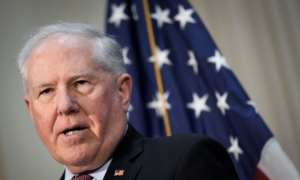China Investing in Military Capabilities to Topple US Defenses: Air Force Secretary
China’s communist regime is the leading threat to the United States and is operating with the intent of displacing the United States as a global superpower, according to a senior Pentagon official.“The reason I came back into government, more than any other by far, is my concern about China’s military modernization program,” said Secretary of the Air Force Frank Kendall during a Sept. 29 talk at the Center for American Progress, a progressive think tank. “When people ask me what my priorities are I tend to say ‘China, China, China.’” Kendall said that the Chinese Communist Party (CCP) is systematically investing in capabilities intended to counter and destroy the United States’ ability to project power globally. These include efforts to develop weapons that could counter or destroy American satellites, aircraft carriers, airfields, and communications and logistics nodes, Kendall said. “The only nation-state that has the capacity, the resources, and the strategic intent to really threaten the United States as a leader in the world … is China,” he said. Kendall added that, by countering the United States’ capacity for power projection, the CCP is laying the groundwork for further aggression against Taiwan, and in the South and East China Seas more broadly. Perhaps nowhere more so is China challenging U.S. dominance than with the rapid expansion and modernization of its nuclear arsenal, Kendall said. “One of the most significant changes has been the nuclear breakout of China,” Kendall said. “We’re now going to be in a world where China has a nuclear arsenal comparable to both Russia and the United States.” The Pentagon expects the CCP to reach a minimum of 1,000 nuclear weapons by 2030. Kendall said that this new “tripolar world” of nuclear powers will challenge U.S. resolve and strategy. Patty-Jane Geller, a senior policy analyst at the Heritage Foundation, previously told The Epoch Times that this nuclear multipolarity is an immense issue for U.S. national security, as the current U.S. nuclear arsenal and posture was only designed to contend with Russia, not China, much less both simultaneously. “U.S. nuclear posture is currently sized to face only one peer nuclear threat (Russia), as it was designed about a decade ago based on assumptions of a more benign threat environment than we are facing today,” Geller said. “With the emergence of China as a second nuclear peer, the United States needs a new strategy that can deter both countries at once, which it will not be able to do sufficiently in the future with the current strategy and force posture.” Ultimately, Kendall said, the current situation resulted from a sustained failure, or naivete, on America’s part regarding the future of nuclear proliferation following the end of the Cold War. “We thought things would change permanently at the end of the Cold War,” Kendall said. “They have not.” Follow Andrew Thornebrooke is a reporter for The Epoch Times covering China-related issues with a focus on defense, military affairs, and national security. He holds a master's in military history from Norwich University.

China’s communist regime is the leading threat to the United States and is operating with the intent of displacing the United States as a global superpower, according to a senior Pentagon official.
“The reason I came back into government, more than any other by far, is my concern about China’s military modernization program,” said Secretary of the Air Force Frank Kendall during a Sept. 29 talk at the Center for American Progress, a progressive think tank.
“When people ask me what my priorities are I tend to say ‘China, China, China.’”
Kendall said that the Chinese Communist Party (CCP) is systematically investing in capabilities intended to counter and destroy the United States’ ability to project power globally.
These include efforts to develop weapons that could counter or destroy American satellites, aircraft carriers, airfields, and communications and logistics nodes, Kendall said.
“The only nation-state that has the capacity, the resources, and the strategic intent to really threaten the United States as a leader in the world … is China,” he said.
Kendall added that, by countering the United States’ capacity for power projection, the CCP is laying the groundwork for further aggression against Taiwan, and in the South and East China Seas more broadly.
Perhaps nowhere more so is China challenging U.S. dominance than with the rapid expansion and modernization of its nuclear arsenal, Kendall said.
“One of the most significant changes has been the nuclear breakout of China,” Kendall said. “We’re now going to be in a world where China has a nuclear arsenal comparable to both Russia and the United States.”
The Pentagon expects the CCP to reach a minimum of 1,000 nuclear weapons by 2030. Kendall said that this new “tripolar world” of nuclear powers will challenge U.S. resolve and strategy.
Patty-Jane Geller, a senior policy analyst at the Heritage Foundation, previously told The Epoch Times that this nuclear multipolarity is an immense issue for U.S. national security, as the current U.S. nuclear arsenal and posture was only designed to contend with Russia, not China, much less both simultaneously.
“U.S. nuclear posture is currently sized to face only one peer nuclear threat (Russia), as it was designed about a decade ago based on assumptions of a more benign threat environment than we are facing today,” Geller said.
“With the emergence of China as a second nuclear peer, the United States needs a new strategy that can deter both countries at once, which it will not be able to do sufficiently in the future with the current strategy and force posture.”
Ultimately, Kendall said, the current situation resulted from a sustained failure, or naivete, on America’s part regarding the future of nuclear proliferation following the end of the Cold War.
“We thought things would change permanently at the end of the Cold War,” Kendall said.
“They have not.”












